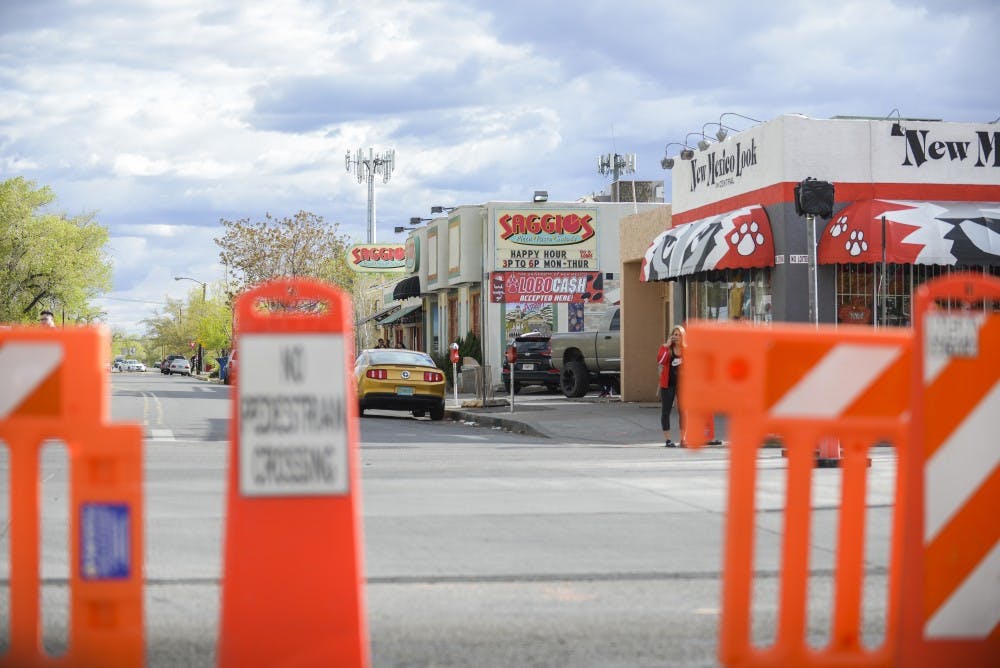“No one wants to be on Central, not even the students,” Olympia Café owner Charlie Akkad said, frustrated over the restaurant’s 30 percent drop in revenue since the start of ART construction. “Mayor Richard Berry should have represented the people -- [ART] is a hindrance and it’s going at a snail’s pace.”
Many owners and managers of local restaurants along Central Avenue echoed Akkad’s frustrations. Since the start of the project, many businesses in the area have experienced consistent drops in revenue, requiring them to cut hours and work with a smaller staff to prevent layoffs.
Bill Hantzapoulos, owner of Gyros, an established 37-year-old eatery, said his restaurant experienced an increase in business before construction started. However, business rapidly declined when the city broke pavement and erected barriers that cut off foot traffic from UNM.
Hantzapoulos said, so far, Gyros is experiencing a 16 percent drop in revenue each month and have cut hours to prevent layoffs. When business is slow, he’s forced to send employees home early.
According to the city’s website dedicated to the project, the finished transit line will “transport more people throughout the corridor while improving walkability,” and “connect the people and businesses that are spread out along the Route 66 corridor, creating a unique and inviting cultural district experience.”
However, Hantzapoulos does not believe the finished rapid transit line will benefit the city and doubts it will increase business.
But he just hopes that former customers return.
“I better see Mayor Berry riding the bus every day,” he said, adding that ART resembles the Rail Runner. “It’s never going to pay itself off or break even.”
Kelly’s Brew Pub Manager David McCrery said people are avoiding Central Avenue because of the traffic and scarce parking, adding that these are the main factors influencing decreased business at Kelly’s. The pub has experienced a 25 percent drop in revenue.
Like Hantzapoulos, McCrery has also cut hours and is now required to spread out duties among the employees.
McCrery said he is “very disappointed” that the city focused on the project’s completion, rather than considering “the interests of local businesses.”
Despite the construction’s impact, McCrery remains hopeful about ART’s potential benefits. He did, however, list some concerns.
Get content from The Daily Lobo delivered to your inbox
Among them, he said ART is designed for a bigger city, adding that it could gentrify Nob Hill and he is worried that chains will start to “pop up and drive out local businesses.”
“I would hate to see that happen,” McCrery said. “Nob Hill is such a fun neighborhood and that is the opposite of what it is supposed to be.”
Rachel Wainwright and Owen Callis, managers at Brickyard Pizza, are also hopeful that the end result “lives up to expectations.”
Brickyard has seen a slight decline in business, they said, adding that their delivery times have increased. However, they said the construction has not affected their revenue.
Wainwright admitted that Brickyard has been lucky, acknowledging the woes of surrounding local businesses, while Callis said their bar and proximity to UNM keeps business steady.
In order to mitigate the construction’s impact on local businesses, the city has been planning to create a privately funded loan program.
Gary Oppedahl, the director of the city’s Economic Development Department, told the Albuquerque Journal last week that an official announcement regarding the loan program “will come in days,” but the department has yet to provide anymore details.
ART construction is set to finish late 2017.
Andres Del Aguila is a news reporter at the Daily Lobo. He can be reached at news@dailylobo.com or on Twitter @Andres_DA95.






